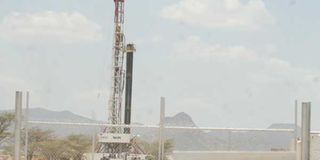Plenty oil jobs coming; where are local experts?

An oil rig at Ngamia 1 . PHOTO | JARED NYATAYA | FILE
What you need to know:
- There is also ERHC Energy, an American corporation, which contracted Chinese company BGP Inc to survey its northern Kenya exploration block and identify the best drilling spots. The company has set aside $40 million (Sh3.4 billion) for the venture.
- A drilling unit has been ordered from Canada, and will be shipped to Kenya later this year. It is expected that training will start in September.
That the country lacks expertise in oil and gas extraction is not news.
Yet petroleum and oil engineers have been listed as the third top-most promising jobs in Africa, according to a report by the online business publication, AFK Insider. This is because of the newfound oil and gas in several parts of the continent, including Kenya.
To put this prevision into focus are the current happenings in the industry. UK-based Tullow Oil, the pioneer in the successful oil exploration endeavours in Kenya, announced recently that it planned to drill 40 wells in the next two years. Canadian exploration company, Taipan Resources, is expected to drill a well in Mandera by the end of September. Pancontinental Oil and Gas, based in Australia, is drilling a well on the Lamu Block.
These have bolstered confidence for other explorers to begin drilling, with FAR, another Australian gas and oil company, saying that it will drill its first well in June 2015.
There is also ERHC Energy, an American corporation, which contracted Chinese company BGP Inc to survey its northern Kenya exploration block and identify the best drilling spots. The company has set aside $40 million (Sh3.4 billion) for the venture.
Camac, a Houston-based firm, is also carrying out seismic work – a precursor to drilling – off Kenya’s coast.
These activities translate into jobs in the local market. The problem is that the local market does not have many people with the requisite expertise necessary to do these jobs that have systematically been opening up since the initial announcements were made about the discoveries in the burgeoning industry.
Though it is not yet publicly known how many experts are working on the operational sites—there is no central database collecting such information—what is telling is that currently, most of what would be described as the more remunerative white collar jobs have been taken by expatriates from South Africa, Pakistan, Indonesia and Malaysia.
The Kenyans who have been hired by these companies so far are generally in lower cadre positions, most of them engaged in menial duties.
“They know we don’t have fully trained seismologists, geologists, instrumentations engineers, to work on the more technical aspects. Largely, the only local people that have been hired by these companies right now are lower semiskilled and unskilled labourers,” confirms Bill Lay, the director of KK Oil and Gas.
He quickly adds: “Demand for skilled labour will surge as more firms begin to drill at Kenya’s oil exploration sites in Turkana, Narok, in the coast, offshore all the way down the Somali border, down to Mozambique…The companies involved in the exploration right now are looking for trained Kenyan employees. But they are simply not there.”
It is for this reason that KK Oil and Gas, a division of KK Security, says Mr Lay, is establishing an oil and gas training centre in Nairobi.
The company recently signed a deal with LearnCorp International, a subsidiary of the Cape Breton University Foundation of Canada. LearnCorp, also known as LCI, offers technical courses for oil and gas contractors.
“We will utilise our industry expertise to work with KK (Training) and monitor developments in East Africa to ensure the right training is delivered at the right time to match the pace of sector development,” said LearnCorp president Lucia Maclsaac, during the announcement about the training centre late last month.
“LCI will provide internationally recognised instructors, curricula and technical support to assist KK Training in the development and delivery of courses and programmes,” MacIsaac said.
“We know that opportunities for trained Kenyans will be there sooner or later, but they all have to have international oil and gas licensing regime,” Mr Lay elaborates.
At present, the institution is offering specialist courses to kick-start certification of local workers in necessary skills – initially in global environmental health and safety, and working at heights.
To be offered also is the International Association of Drilling Contractors (IADC) Rig Pass, a mandatory requirement for all workers seeking access to oil drilling sites, regardless of their other qualifications. This is one’s passport to any rig in the world.
A drilling unit has been ordered from Canada, and will be shipped to Kenya later this year. It is expected that training will start in September.
Once the rig simulating a real life drilling situation has been installed, KK Training will offer six to 12 weeks drilling training to prepare trainees for entry-level positions with drilling contractors. Even already trained welders will require specialised training.
“The common assumption is that the welding taught in polytechnics is enough. What the polytechnics offer qualifies one to be an artisan welder. The welding that is done in the oil and gas industry is much heavier and more complex than basic metal work…” Mr Lay explains.
He stresses the fact that the rig will provide extended training opportunities in real life scenarios, which will enable workers to be directly transferable to the workplace.
Lay says they are still developing curricula and programmes that will span the core industry expertise required. He adds that some courses will take two to three years to complete.




